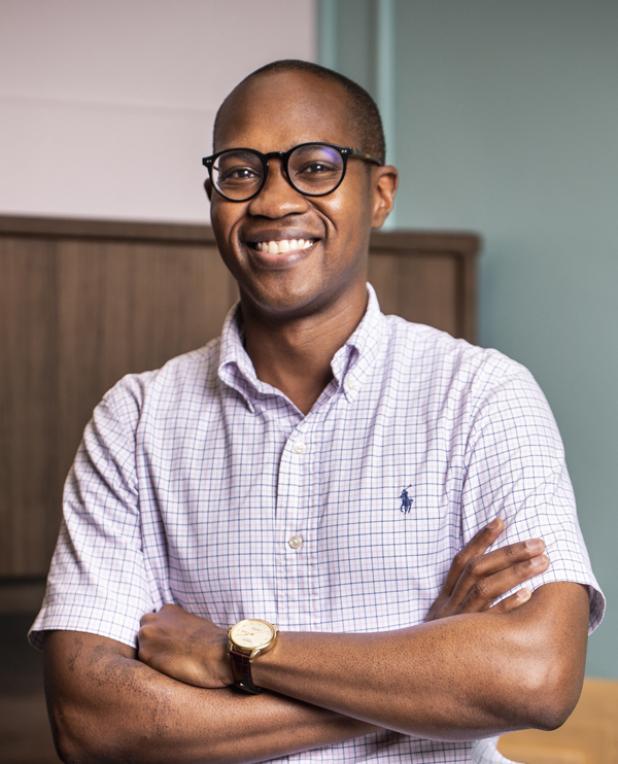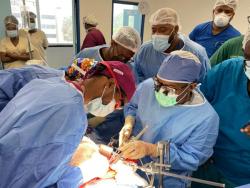
Dr Greg Padmore, Specialist Hepatobiliary and Pancreatic Surgeon.
QEH surgeon in breakthrough cancer operation

An exciting team of young surgeons, an anaesthetist, nurses, and support staff have broken ground in cancer treatment on the island, undertaking a historic surgical procedure at the Queen Elizabeth Hospital (QEH).
On June 8, Barbadian doctors, led by specialist Hepatobiliary and Pancreatic Surgeon Dr Greg Padmore, and Dr Sahle Griffith, a Laparoscopic and Bariatric Surgeon, who also heads the QEH’s Department of Surgery, successfully removed a large, life-threatening liver tumour from a 46-year-old woman.
The intricacies of such surgeries, along with the possibility of a patient bleeding to death, require highly skilled practitioners.
The prognosis for patients with this type of tumour, or colon cancer which has spread to the liver, is often grim, the result being reduced life expectancy. Such patients, presenting with late-stage cancer, are usually transitioned to the best supportive or palliative care.
There, once deemed eligible, they receive chemotherapy which aims to decrease the rate of progression of the disease, along with supportive care.
Overall, cancer care requires a multidisciplinary team approach, involving the surgeon, oncologist, radiologist, and pathologist, just to name a few of the specialists on the team.
Dr Padmore, who returned home for a break from his year-long fellowship at the University of Calgary in Alberta, Canada, where he is finishing sub-specialty training in Hepatobiliary and Pancreatic Surgery, is expected to make a big difference to the survival rate of these patients in Barbados.
Few places in the Caribbean can provide such treatment and the nearest North American source in Miami, Florida, can cost between US$250 000 and US$500 000 for the suite of treatments and follow up visits, which include oncology care.
To be regarded as an expert in the area, a Fellow is expected to complete a minimum of 20 of these complex major liver resections. So far, Dr Padmore has done more than 50.
Dr Padmore, the 2012 QEH Intern of the Year, is a trail blazer, even though he is extremely modest about his accomplishments.
On completion of his Hepatobiliary and Pancreatic Surgery Fellowship, he will commence a year-long sub-specialty fellowship in Surgical Oncology.
In a brief interview following the surgical procedure at the QEH, Dr Padmore noted that in the Barbados context, in addition to pancreatic cancer, colorectal cancers which have spread to the liver, are likely to form the bulk of the procedures he will undertake.
“We have one of the highest incidence rates of colon cancer, and it is well known in the literature that compared to chemotherapy, patients who are resectable for tumours that have spread to the liver, resection (the process of cutting out tissue or part of an organ) is a great adjunct to chemotherapy.
“I felt it was an important area to pursue in my career and to be able to make a difference in the lives of colon cancer patients, with aims to improve the five-year survival rate for Stage 4 patients in Barbados.
“I will be able to perform most procedures related to the liver, as well as operations related to pancreatic cancers, and these have a fairly high incidence and high mortality rate in Barbados,” Dr Padmore noted.
The surgeon explained that while resection offered significant hope of a much better outcome for such patients, he cautioned that not all late-stage cancer patients are good candidates for this procedure.
Asked why such surgeries had not been available to patients locally, he explained it was simply the absence of specialist training.
“The fellowship requires you go to high volume centres where the operation is being done by a group of persons. The volume of surgeries is what is necessary with hands-on training by experts because these surgeries are out of the realm of routine, general surgical procedures.
“If you are not accustomed or trained to do them, the outcomes have been shown to be poor. Operating on a liver can result in much blood loss and increase the threat of death and complications in the patient,” he explained.
Commenting on the significance of the procedure, Dr Griffith was excited about the future of medical care for many who develop these types of tumours.
“Until we have somebody like Dr Padmore in this environment, we are going to continue to have very high mortality from colon cancer and until we are able to get proper screening in place. That requires capacity building.
“We also need to acknowledge the skill set required to remove the liver safely. I am not talking about removing little pieces of liver, but removing large chunks of the liver and proper pancreatic work. That was not available before, and it is now.
“Once Dr Padmore is back, he will be able to do more complicated cancer surgeries, as well as help to significantly bolster our cancer treatment,” Dr Griffith added.
Executive Chairperson of the QEH, Juliette Bynoe-Sutherland, was thrilled with the performance of the medical team and congratulated them on the successful procedure.
Bynoe-Sutherland stated: “We are extremely pleased to have created an environment that brings out the best in our clinical teams. We have invested in training, facilities, surgical instruments, and equipment, but most importantly, we have sought to restore hope and excitement about clinical practice.
“We have been working hard to rebuild the image of the QEH as the premiere health care institution in the region. This team offers a glimpse into the future of surgery in Barbados. Barbadians can feel proud as they are in good hands!”
The surgical team involved in the QEH operation also comprised Dr Alex Doyle, a research fellow with the Caribbean Colon Cancer Research Institute; Dr Rico Boyce, a Senior Registrar; Dr Jamar Crichlow, a Registrar who is due to continue further training in the United Kingdom, and Anaesthetist Dr Karisha Hinkson-LaCorbinière.
(PR/QEH)
